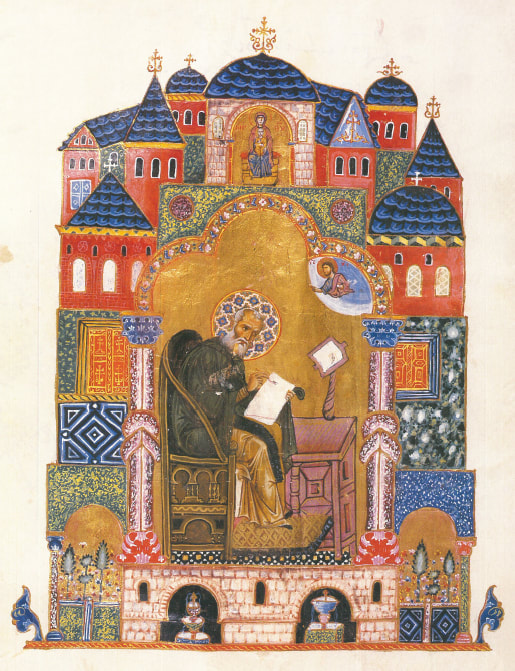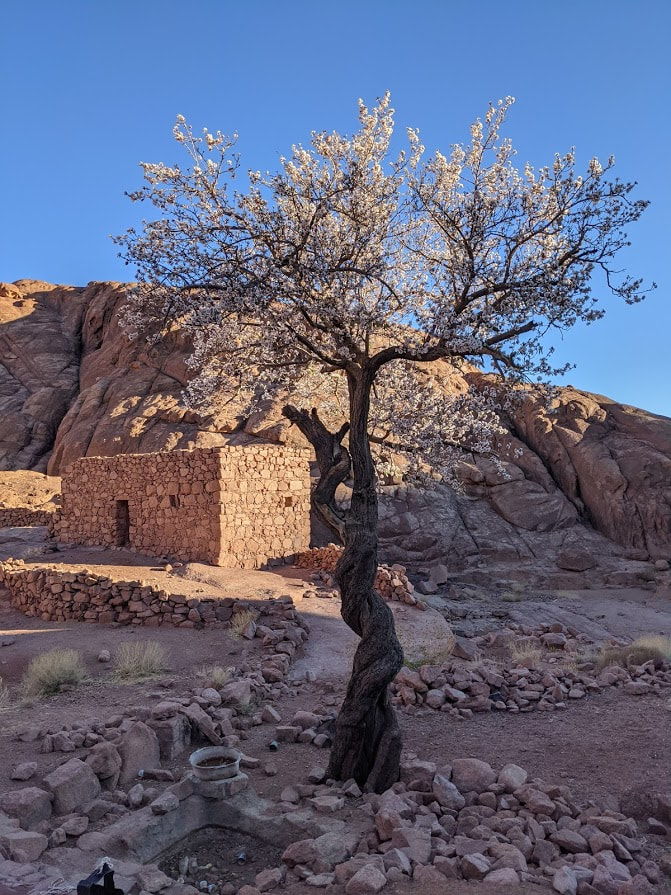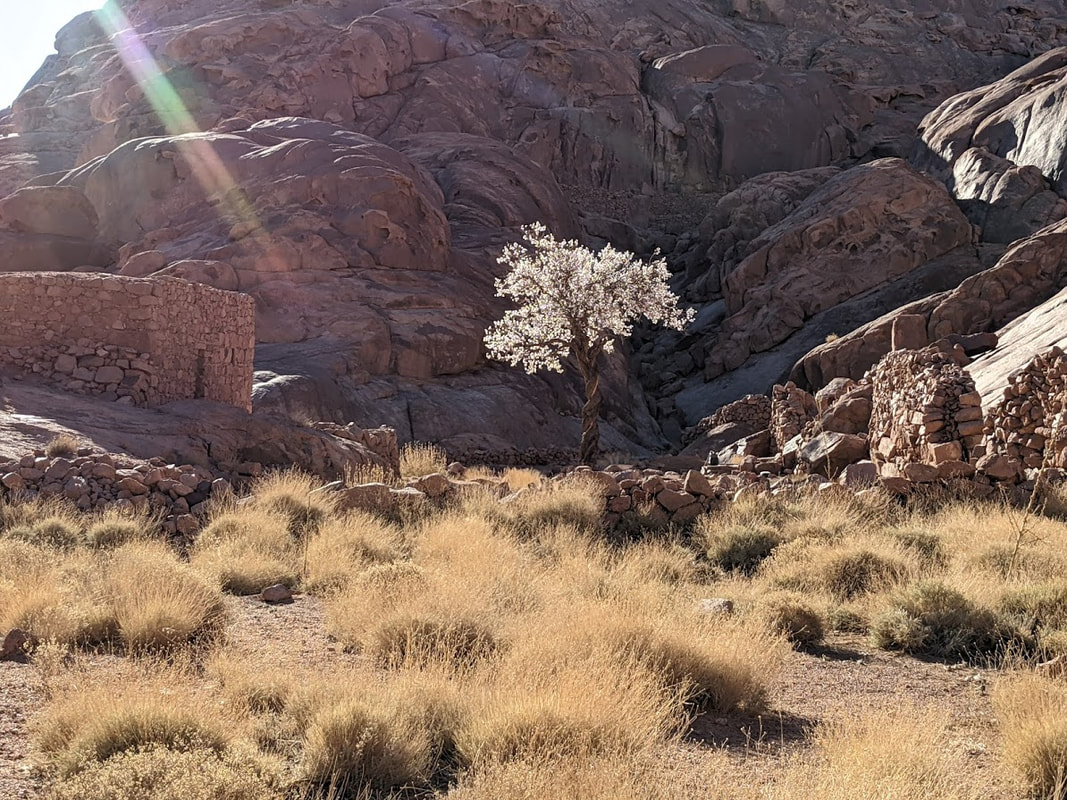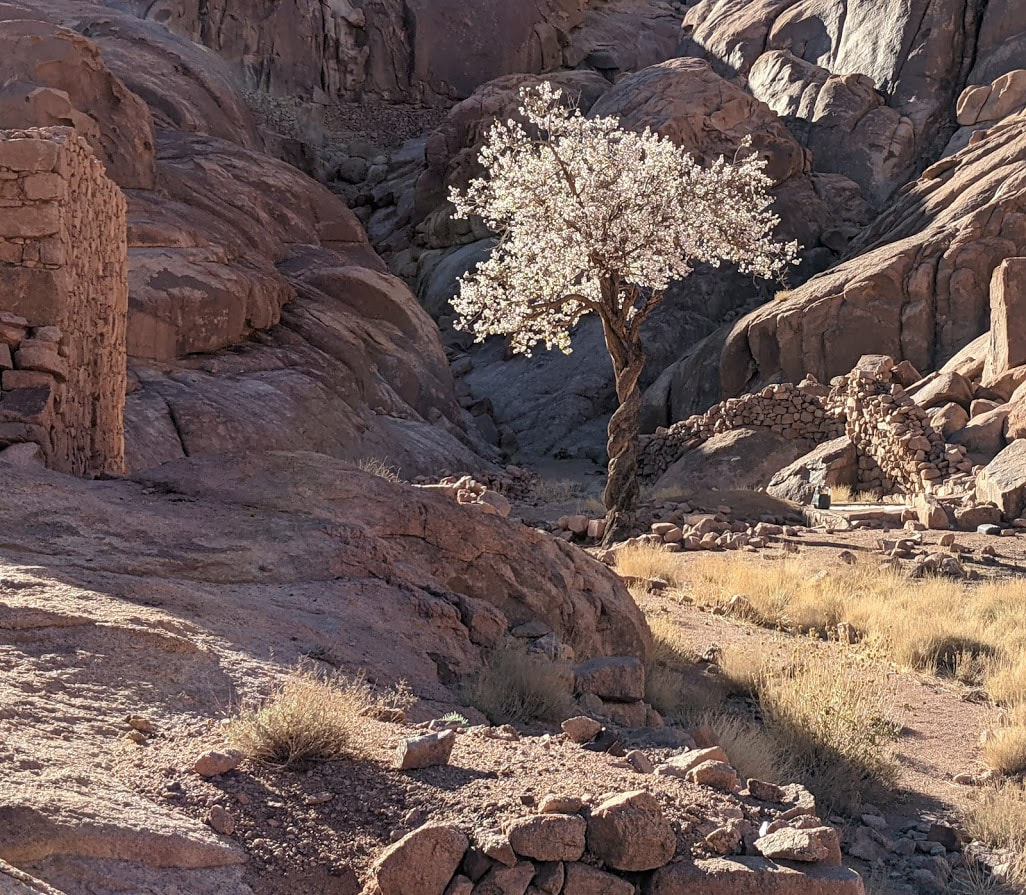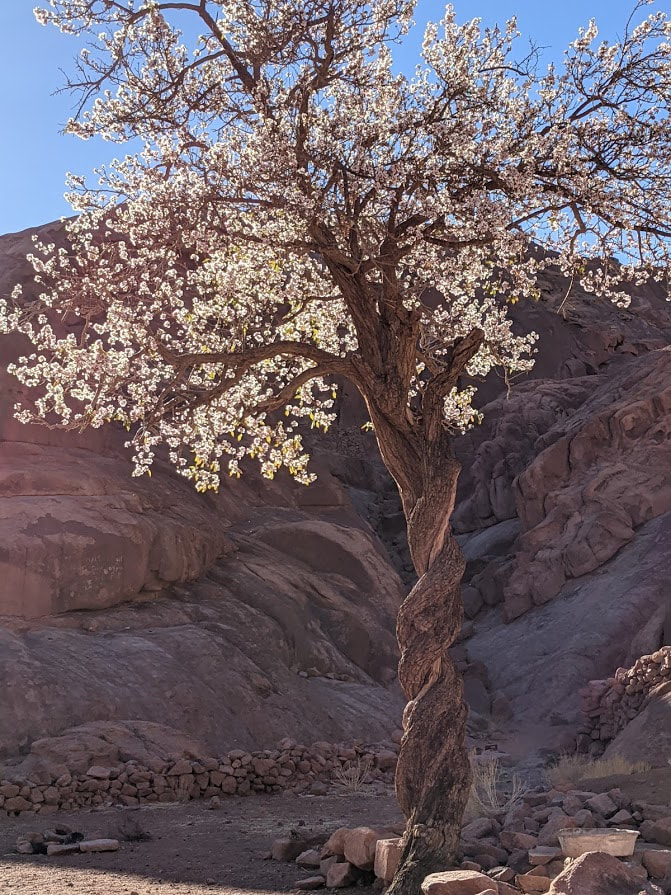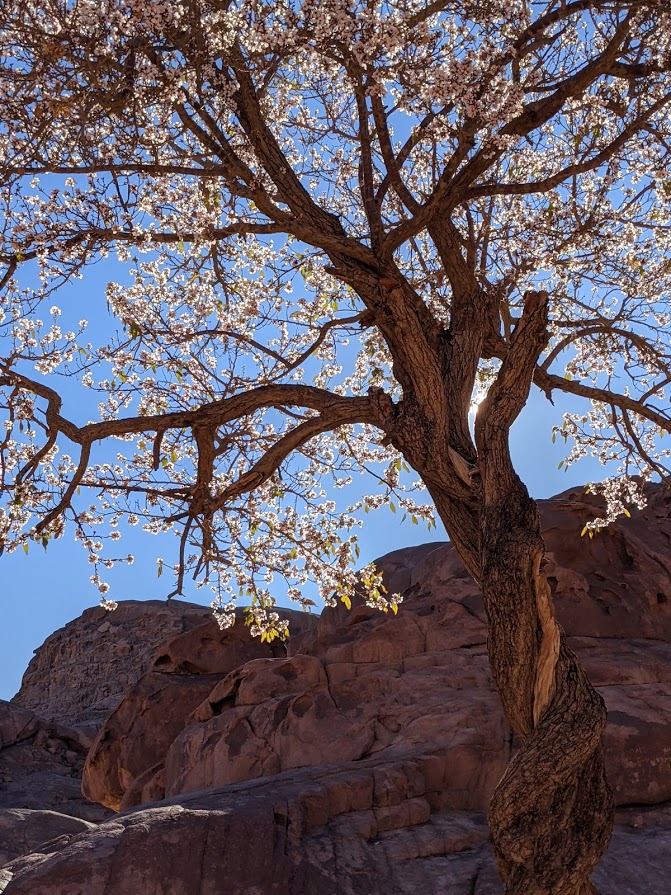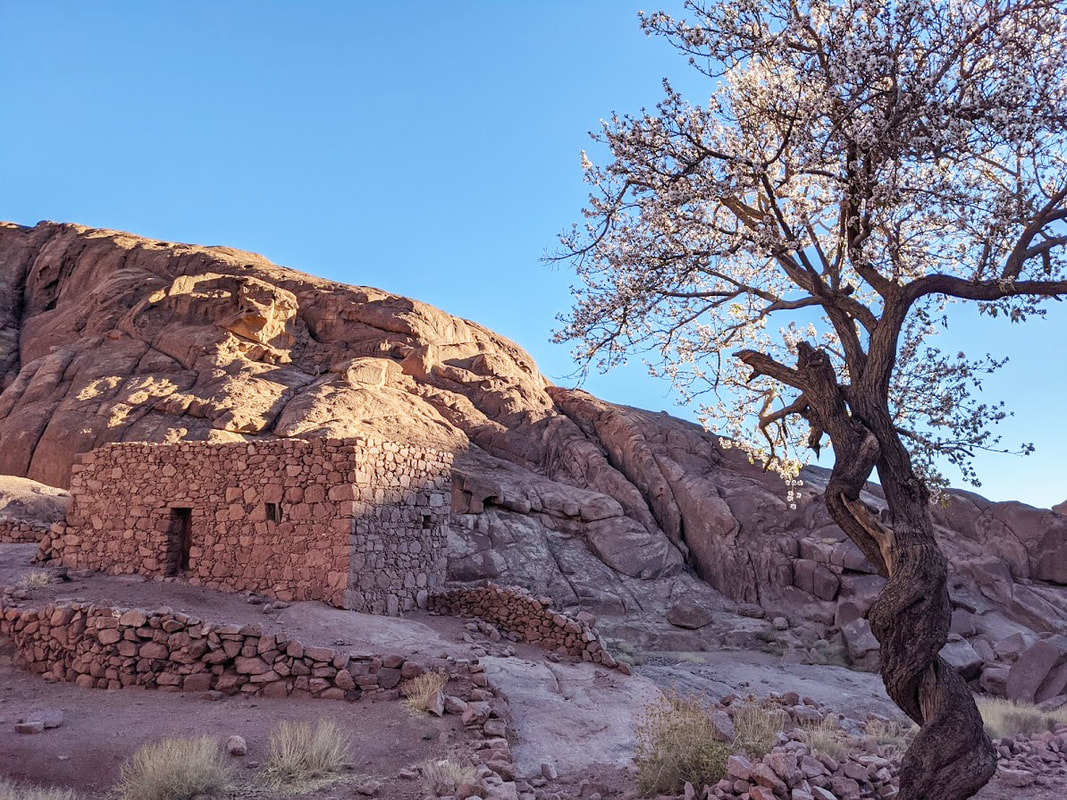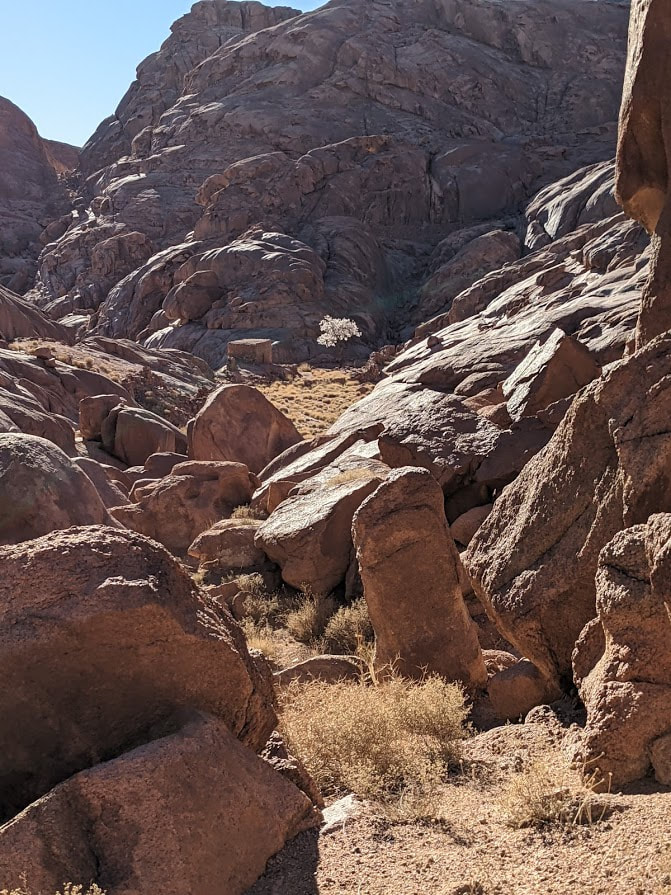Illuminated manuscript depicting St. Gregory of Sinai found in the St. Catherine's Monastery library.
THE VENERABLE GREGORY THE SINAITE
August 8
"But I am at a loss to know how to write about the root of all virtues, his obedience and profound humility, lest it should seem to the easy-going that I am telling a lie, but as it would be a sin against the truth itself to remain silent about it, I must relate what I heard from his most devoted and sincere disciple Gerasimus." ~Kallistos, Patriarch of Constantinople
St. Gregory of Sinai was born around 1265 in the small village of Klazomenai in Asia Minor, close to Smyrna. He was tonsured as a rasophore monk in Cyprus, living in silence under the direction of a virtuous hermit. In time, he desired greater asceticism and traveled to St. Catherine's Monastery in Sinai where he received both the lesser and later, the greater Schema. When he arrived in Sinai, with great courage, he put aside all earthly desires and zealously engaged in the divine struggle. Very quickly he amazed his more experienced Sinai brethren with his angelic monastic life of strict fasting, vigils, all-night hymnody and prayer. He was known as 'the bodiless one' by the other ascetics in Sinai.
His disciple, blessed Gerasimus, later wrote that the divine Gregory zealously carried out every obedience without hesitation or delay. He was always aware it was God who was observing his labors and not his superior alone. He quickly achieved a complete renunciation of his self-will. In spite of his many obediences on behalf of the monastery, he never neglected to faithfully fulfill his rule of prayer. After confessing his sins with a broken spirit to his abbot and receiving a blessing to retire for the evening, he would seal his door, clear his mind of distractions, and then draw close to God through unceasing prayer of the heart and psalmody, often reading the Psalter in its entirety until the sounding of the semantron for Orthos in the morning. He then would be the first to arrive for the service and the last to depart. He would eat only enough of a crust of bread and sip enough water to sustain life. According to his disciple Gerasimus, he lived as an "incorporeal angel, bearing an immaterial principle in a material body."
He was assigned the obedience of serving as a cook and baker for the brotherhood for more than three years. Though this was generally regarded as a lowly task, he considered himself serving angels rather than men and felt deeply honored for such an obedience. He was also extremely skilled in calligraphy and spent much time in spiritual study and reading. He surpassed most in his theological knowledge. Because of his great devotion for the God-seer Moses, he had a pious custom of climbing the holy God-trodden Mount Sinai, up the 3000 Steps of Repentance, almost daily in order to pray in deep reverence at the site where God had openly revealed Himself.
In time, his labors began to arouse jealousy and envy among fellow Sinai ascetics. In order to not be a temptation and stumbling block for them, he quietly took his faithful disciple, Gerasimus, and left for Jerusalem. It was because of his ascetic exploits at Sinai that he received the name Sinaite.
His disciple, blessed Gerasimus, later wrote that the divine Gregory zealously carried out every obedience without hesitation or delay. He was always aware it was God who was observing his labors and not his superior alone. He quickly achieved a complete renunciation of his self-will. In spite of his many obediences on behalf of the monastery, he never neglected to faithfully fulfill his rule of prayer. After confessing his sins with a broken spirit to his abbot and receiving a blessing to retire for the evening, he would seal his door, clear his mind of distractions, and then draw close to God through unceasing prayer of the heart and psalmody, often reading the Psalter in its entirety until the sounding of the semantron for Orthos in the morning. He then would be the first to arrive for the service and the last to depart. He would eat only enough of a crust of bread and sip enough water to sustain life. According to his disciple Gerasimus, he lived as an "incorporeal angel, bearing an immaterial principle in a material body."
He was assigned the obedience of serving as a cook and baker for the brotherhood for more than three years. Though this was generally regarded as a lowly task, he considered himself serving angels rather than men and felt deeply honored for such an obedience. He was also extremely skilled in calligraphy and spent much time in spiritual study and reading. He surpassed most in his theological knowledge. Because of his great devotion for the God-seer Moses, he had a pious custom of climbing the holy God-trodden Mount Sinai, up the 3000 Steps of Repentance, almost daily in order to pray in deep reverence at the site where God had openly revealed Himself.
In time, his labors began to arouse jealousy and envy among fellow Sinai ascetics. In order to not be a temptation and stumbling block for them, he quietly took his faithful disciple, Gerasimus, and left for Jerusalem. It was because of his ascetic exploits at Sinai that he received the name Sinaite.
St. Gregory of Sinai's cell in the high country behind Mount Sinai. The almond tree in bloom was three trees intentionally twisted into one.
Gregory is called "the Sinaite" because he received the monastic tonsure on Mount Sinai. During the reign of Emperor Andronicus Palaeologus (about the year 1330 A.D.), he arrived at Mt. Athos to visit the monasteries and to learn more, if possible, about the practice of mental prayer and contemplation. At that time, however, these two forms of spiritual practice were almost unknown among the holy Athonites. The only one who knew them--and practiced them to perfection--was St. Maximus of Kapsokalyvia. Gregory spread his understanding about mental prayer through all the cells and monasteries on Mt. Athos. His most distinguished disciple there was Kallistos, Patriarch of Constantinople, who would later write the biography of St. Gregory. After this, Gregory crossed over to Macedonia and to other Balkan regions, and established communities in which the monks practiced mental prayer. Thus he assisted many in the deepening of their prayer, to their salvation. His writings about mental prayer and asceticism can be found in the book "Dobrotoljublja: The Philokalia." Among other things, he wrote the hymn to the Holy Trinity "It is meet and right," which is sung at the Sunday Midnight Service. Gregory was one of the most eminent ascetics and spiritual teachers of the Balkans. He died peacefully after a long and laborious life, and took up his habitation in the Kingdom of God.
The cell and hermitage of St. Gregory of Sinai with twisted almond tree in bloom.
From the Sinai Gerontikon:
Note: The translation below comes from an edition published by St. George Monastery in Jerusalem. Studion Ministries is presently working on a new edition officially blessed by Archbishop Damianos of Sinai. The copyright and all profits of the new edition, when released, will belong to St. Catherine's Monastery in Sinai.
Excerpted from The Life of St. Gregory Sinaites, by Patriarch Kallistos of Constantinople.
1. ...And he wore the monastic attire that he had received from him and spent a little time with him, and after gaining spiritual insight, he too, like Moses before him who saw God, ascended Mount Sinai; there his head was shorn and, together with his hair, he forsook his fleshly desires and mortified his bodily urges, diving deeper and deeper and fighting stalwartly the good fight of faith. After but a short time, he had so astounded everyone by his spiritual and nearly incorporeal existence of fasting and vigils and unrelenting comportment, as well as his endless and unbroken psalm recitation spanning whole nights at a time, not to mention his petition and intercession with God. It was as if he strived to bring the spiritual and immaterial into his physical body; everyone thought he was almost miraculously free from fleshly constraints. He was such a student of obedience — the root and mother of the virtues, exalting the humble — that we are loath to commit all the details to writing for fear that wagging tongues should accuse us of telling tall tales. But even so, I will not keep silent and stifle the word of truth altogether, and I will record all that I have been taught and learned from his most faithful student, who loved him to the utmost, who followed in his footsteps and gave an exact imprint of his virtues; I mean of course the holy Father Gerasimus. For this blessed man gives an exact account and confirms that, “Once he had diligently and speedily completed whatever task the Abbot had assigned him, as if God were observing his affairs from above, he was never missing when the brothers assembled for the liturgy. And then when evening fell, he would confess his sins to the Abbot and receive his customary blessing. Afterwards, he would retire to his cell and seal the doors, and as soon as he was shut in, he would lift his hands towards God, being careful to clear his mind utterly of distractions, drawing near to God as God drew near to him. Then he would rush eagerly to the liturgy and offer up psalms to God, kneeling and praying all night long with his whole heart until he had carefully recited all the Davidic psalms and felt their ecstasy flood his soul.
Later when the wood was struck, he would always be the first outside the chapel gate, standing at attention and meditating, which he did with unflagging intensity; he would never leave the church before the morning prayers to God had been completed, and he was always first to enter the sanctuary, leaving after everyone else. His food was a crust of bread and a sip of water, just enough to keep him alive; in this way he sought to "dissolve the body’s hold on his spirit even before he died.”
1. ...And he wore the monastic attire that he had received from him and spent a little time with him, and after gaining spiritual insight, he too, like Moses before him who saw God, ascended Mount Sinai; there his head was shorn and, together with his hair, he forsook his fleshly desires and mortified his bodily urges, diving deeper and deeper and fighting stalwartly the good fight of faith. After but a short time, he had so astounded everyone by his spiritual and nearly incorporeal existence of fasting and vigils and unrelenting comportment, as well as his endless and unbroken psalm recitation spanning whole nights at a time, not to mention his petition and intercession with God. It was as if he strived to bring the spiritual and immaterial into his physical body; everyone thought he was almost miraculously free from fleshly constraints. He was such a student of obedience — the root and mother of the virtues, exalting the humble — that we are loath to commit all the details to writing for fear that wagging tongues should accuse us of telling tall tales. But even so, I will not keep silent and stifle the word of truth altogether, and I will record all that I have been taught and learned from his most faithful student, who loved him to the utmost, who followed in his footsteps and gave an exact imprint of his virtues; I mean of course the holy Father Gerasimus. For this blessed man gives an exact account and confirms that, “Once he had diligently and speedily completed whatever task the Abbot had assigned him, as if God were observing his affairs from above, he was never missing when the brothers assembled for the liturgy. And then when evening fell, he would confess his sins to the Abbot and receive his customary blessing. Afterwards, he would retire to his cell and seal the doors, and as soon as he was shut in, he would lift his hands towards God, being careful to clear his mind utterly of distractions, drawing near to God as God drew near to him. Then he would rush eagerly to the liturgy and offer up psalms to God, kneeling and praying all night long with his whole heart until he had carefully recited all the Davidic psalms and felt their ecstasy flood his soul.
Later when the wood was struck, he would always be the first outside the chapel gate, standing at attention and meditating, which he did with unflagging intensity; he would never leave the church before the morning prayers to God had been completed, and he was always first to enter the sanctuary, leaving after everyone else. His food was a crust of bread and a sip of water, just enough to keep him alive; in this way he sought to "dissolve the body’s hold on his spirit even before he died.”
2. But who could do justice to his work in the kitchen and the mancipium where he served for over three years, and to the great restraint which he showed; for the thought never entered his mind that he was serving men, but his commission was angelic, and he saw the place of his service as the very sanctuary and altar of God. Moreover he was devoted to honoring Moses the Great, the God-seer, as he deserved, to whom God spoke face-to-face, not in riddles; he almost never failed to ascend to the August and Holy Summit of Mount Sinai almost every time and in deep reverence to venerate the colossal wonders which had taken place there. This was a holy man and his hands were diligent at calligraphy, but he was just as fond of reading and would pore over his books night and day, like a hardworking bee, diligently gathering the blossoms of Divine Scripture (meaning both Old and New Testaments) and impressing them upon his mind, more than any other I know, for he outmatched and outpaced all his peers.
3. But the Evil One could not abide this state of affairs, that age-old foe and adversary of the race of man, he inflamed the monks with jealousy, sowing confusion and discord in among them like tares among the wheat. But Gregory, the student of gentleness and peace, sensed their jealousy and stole away from the monastery, taking with him the venerable Gerasimus; this man hailed from the Island of the Euripus, of the line of king Bonifacio. He had already forsaken his great fortune and vain-glory and counted it, as did the great Apostle, as rubbish compared to the vision that is to be revealed to the just. So taking his cross on his shoulders, he went himself to Mount Sinai, where he met the divine Gregory and marveled at his surpassing virtue. He became one of his students, and by God’s support and assistance, he ascended to the heights of both deed and thought, so that he was after him a paragon and model to the others of all good things...
From the Philokalia:
Volume 4
"You cannot be or become spiritually intelligent in the way that is natural to man in his pre-fallen state unless you first attain purity and freedom from corruption. For our purity has been overlaid by a state of sense-dominated mindlessness, and our original incorruption by the corruption of the flesh." ~ pg. 212, #1.
"Only those who through their purity have become saints are spiritually intelligent in the way that is natural to man in his pre-fallen state. Mere skill in reasoning does not make a person's intelligence pure, for since the fall our intelligence has been corrupted by evil thoughts. The materialistic and wordy spirit of the wisdom of this world may lead us to speak about ever wider spheres of knowledge, but it renders our thoughts increasingly crude and uncouth. This combination of well-informed talk and crude thought falls far short of real wisdom and contemplation, as well as of undivided and unified knowledge." ~ pg. 212, #2.
"By knowledge of truth understand above all apprehension of truth through grace. Other kinds of knowledge should be regarded as images of intellection or the rational demonstration of facts." ~ pg. 212, #3.
"If you fail to receive grace, it is because of your lack of faith and your negligence; if you find it again, it is because of your faith and your diligence. For faith and diligence always conduce to progress, while their opposites do the reverse." ~ pg. 212, #4.
"Nothing so converts anger into joy and gentleness as courage and mercy. Like a siege-engine, courage shatters enemies attacking the soul from without, mercy those attacking it from within." ~ pg. 214, #13.
"To try to discover the meaning of the commandments through study and reading without actually living in accordance with them is like mistaking the shadow of something for its reality. It is only by participating in the truth that you can share in the meaning of truth. If you search for the meaning without participating in the truth and without having been initiated into it, you will find only a besotted kind of wisdom (cf. 1Corinthians 1:20)." ~ pg. 216, #22.
"Grace-imbued faith, energized by the Spirit through our keeping of the commandments, alone suffices for salvation, provided we sustain it and do not opt for a dead and ineffectual faith rather than for a living effective faith in Christ. To embody and give life to an effective faith in Christ is all we need to do as believers. But nowadays we who call ourselves orthodox believers have in our ignorance imbibed not the faith imbued with grace but a faith that is merely a matter of words, dead and unfeeling." ~ pg. 217, #28.
"Only those who through their purity have become saints are spiritually intelligent in the way that is natural to man in his pre-fallen state. Mere skill in reasoning does not make a person's intelligence pure, for since the fall our intelligence has been corrupted by evil thoughts. The materialistic and wordy spirit of the wisdom of this world may lead us to speak about ever wider spheres of knowledge, but it renders our thoughts increasingly crude and uncouth. This combination of well-informed talk and crude thought falls far short of real wisdom and contemplation, as well as of undivided and unified knowledge." ~ pg. 212, #2.
"By knowledge of truth understand above all apprehension of truth through grace. Other kinds of knowledge should be regarded as images of intellection or the rational demonstration of facts." ~ pg. 212, #3.
"If you fail to receive grace, it is because of your lack of faith and your negligence; if you find it again, it is because of your faith and your diligence. For faith and diligence always conduce to progress, while their opposites do the reverse." ~ pg. 212, #4.
"Nothing so converts anger into joy and gentleness as courage and mercy. Like a siege-engine, courage shatters enemies attacking the soul from without, mercy those attacking it from within." ~ pg. 214, #13.
"To try to discover the meaning of the commandments through study and reading without actually living in accordance with them is like mistaking the shadow of something for its reality. It is only by participating in the truth that you can share in the meaning of truth. If you search for the meaning without participating in the truth and without having been initiated into it, you will find only a besotted kind of wisdom (cf. 1Corinthians 1:20)." ~ pg. 216, #22.
"Grace-imbued faith, energized by the Spirit through our keeping of the commandments, alone suffices for salvation, provided we sustain it and do not opt for a dead and ineffectual faith rather than for a living effective faith in Christ. To embody and give life to an effective faith in Christ is all we need to do as believers. But nowadays we who call ourselves orthodox believers have in our ignorance imbibed not the faith imbued with grace but a faith that is merely a matter of words, dead and unfeeling." ~ pg. 217, #28.
"The Trinity is simple unity, unqualified and uncompounded. It is three-in-one, for God is three-personed, each person wholly interpenetrating the others without any loss of distinct personal identity." ~ pg. 217, #29.
"God reveals and manifests Himself in all things in a threefold manner. In Himself He is undetermined; but through the Son in the Holy Spirit He sustains and watches over all things. And wherever He expresses Himself, none of the three Persons is manifest or to be perceived apart from or without the other two." ~ pg. 218, #30.
"Passion-embroiled states are foretastes of hell's torments, just as the activity of the virtues is a foretaste of the kingdom of heaven. We must realize that the commandments are activities producing effects, and that virtues are states, just as vices that have taken root are also states." ~ pg. 218, #35.
"As the first fruits of future chastisement are secretly present in the souls of sinners, so the foretaste of future blessings is present and experienced in the hearts of the righteous through the activity of the Spirit. For a life lived virtuously is the kingdom of heaven, just as a passion-embroiled state is hell." ~ pg. 219, #38.
"God reveals and manifests Himself in all things in a threefold manner. In Himself He is undetermined; but through the Son in the Holy Spirit He sustains and watches over all things. And wherever He expresses Himself, none of the three Persons is manifest or to be perceived apart from or without the other two." ~ pg. 218, #30.
"Passion-embroiled states are foretastes of hell's torments, just as the activity of the virtues is a foretaste of the kingdom of heaven. We must realize that the commandments are activities producing effects, and that virtues are states, just as vices that have taken root are also states." ~ pg. 218, #35.
"As the first fruits of future chastisement are secretly present in the souls of sinners, so the foretaste of future blessings is present and experienced in the hearts of the righteous through the activity of the Spirit. For a life lived virtuously is the kingdom of heaven, just as a passion-embroiled state is hell." ~ pg. 219, #38.

